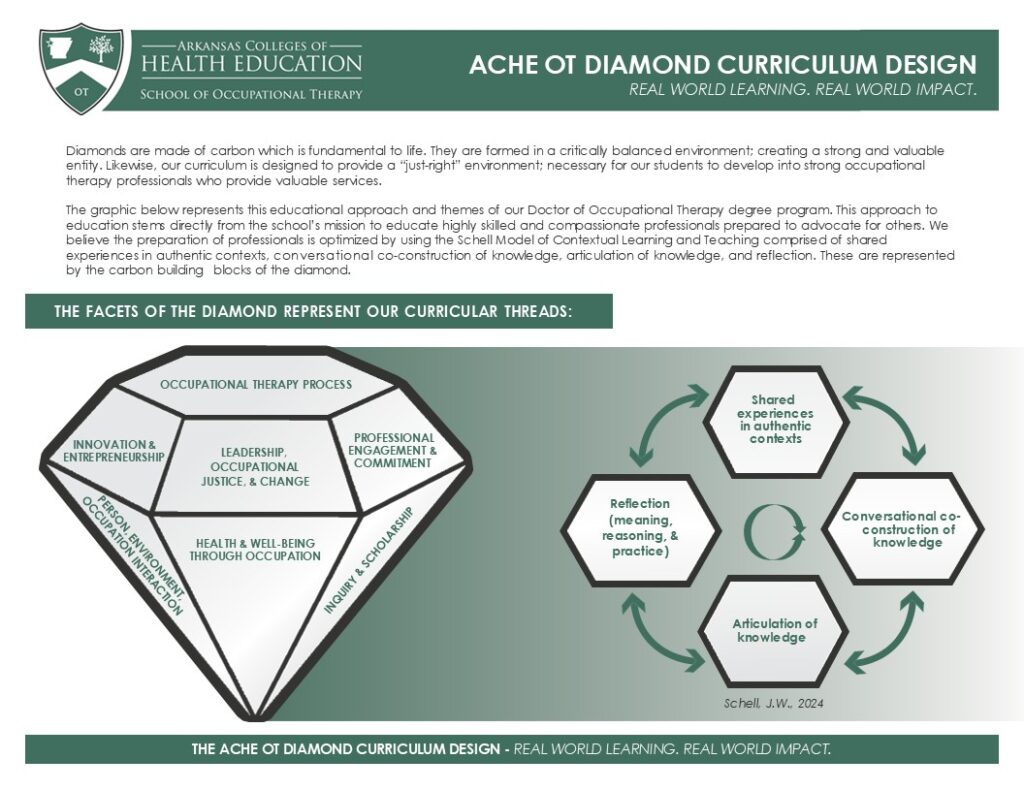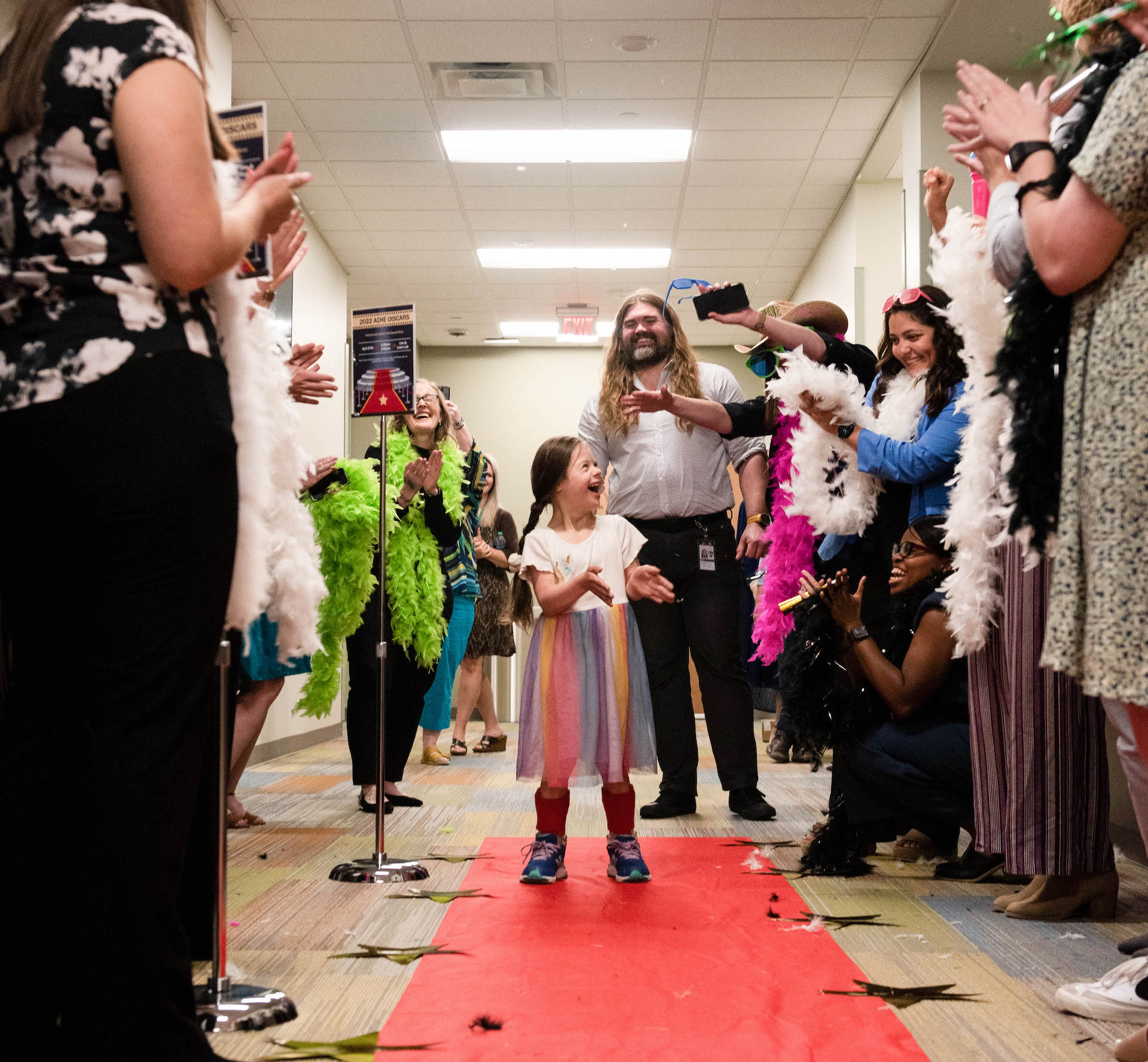About ACHE OT
Our Vision
The Arkansas Colleges of Health Education School of Occupational Therapy will be nationally and internationally recognized as a pioneer in innovative occupational therapy education and as a partner in practice and research to meet real world occupational needs.
Our Mission
To educate highly skilled and compassionate occupational therapy professionals and to prepare them to advocate for those with limited opportunities for occupational engagement.
Type of program:
Our entry-level Doctor of Occupational Therapy (OTD) program is delivered in person, with immersive fieldwork and doctoral capstone experiences conducted off campus to provide real-world, hands-on learning opportunities.
Length of program:
The standard length of study (time to complete the Doctor of Occupational Therapy degree program) is 9 continuous academic semesters of full-time work, completed in 36 months. All Level II Fieldwork and Doctoral Capstone courses must be completed within 24 months of ending the final full semester of didactic coursework.
Doctor of Occupational Therapy Curriculum
The purpose of the Doctor of Occupational Therapy at the Arkansas Colleges of Health Education is to educate and prepare skilled and compassionate occupational therapy professionals who understand, engage, and equitably find solutions to barriers affecting health. By employing educational experiences that are learner-focused, contextually relevant, authentic, and centered on occupation, graduates will collaborate with clients to optimize their lives.
The curriculum will prepare graduates to practice as generalists with broad exposure to practice settings and practice areas, including new and emerging areas. Additionally, the curriculum will prepare occupational therapy graduates to work with a variety of populations, including, but not limited to, infants, children, adolescents, adults, and older adults in areas of physical and mental health.
Curriculum and Teaching Approach
Like diamonds formed under the right conditions, our curriculum creates a “just-right” environment that shapes students into strong, valuable occupational therapy professionals. Rooted in our mission, we use the Schell Model of Contextual Learning to support learning through authentic experiences, collaboration, and reflection. These elements mirror the carbon building blocks that form a diamond—strong, connected, and purposeful.
Student Learning Outcomes
Graduates of the School of Occupational Therapy will:
- Transform health and well-being through the use of occupation across the lifespan.
- Embrace humans as occupational beings who exist within the context of their environments and occupations who desire to create/promote their own opportunities for occupational performance and engagement.
- Creatively solve occupation-related problems with populations, communities, groups, and individuals so they can live life to the fullest.
- Display a professional identity and investment in the profession necessary for success as an occupational therapy student and practitioner; thereby facilitating social change.
- Appraise, design, and implement ethical scholarship to inform occupational therapy practice and positively influence health, health services, and the healthcare system.
- Inspire, develop, advocate, and lead occupational therapy programming that maximizes equitable occupational engagement and creates change to meet healthcare, community, and educational needs.
- Create contemporary programming, products, and businesses for persons, groups, organizations, and communities to promote health, well-being, and participation.
Progression, Retention, and Graduation
Program Progression
Accreditation of ACHE OT is based on a curriculum design that prepares students for entry-level occupational therapy practice. The ACHE OT curriculum design is created to enable students to move into professional roles with a greater level of expertise. Therefore, progression through the program is contingent upon successful completion of courses in the prescribed sequence. Successful completion requires an earned 3.0 cumulative GPA each semester with the exception of the first semester, when a student may earn a GPA of less than 3.0.
Eligibility for graduation with a Doctor of Occupational Therapy requires students enrolled in ACHE OT complete all didactic, fieldwork, and capstone coursework outlined in the curriculum sequence with an earned cumulative GPA of 3.0 or above in a timely manner. All level II fieldwork and the doctoral capstone courses must be completed within 24 months of the final full-time semester of didactic coursework.
In addition to the academic requirements, students enrolled in ACHE OT must adhere to the standards set forth in the ACHE Code of Student Conduct, AOTA Code of Ethics, ACHE OT Student Handbook, and related policies regarding student conduct such as professionalism (e.g., professional development program) and academic integrity.
Degrees are not awarded solely upon the completion of any prescribed number of courses, credits, or upon passing a prescribed number of examinations. Granting of the degree requires in addition, that the ACHE faculty has concluded the student has attained sufficient maturity of thought, and ethical and professional proficiency. Matriculation and enrollment does not guarantee the issuance of a degree without satisfactorily meeting the aforementioned curriculum and degree requirements.
Retention
ACHE OT makes it a priority to support students academically and in other areas that may impact retention and success through various programs offered by ACHE Office of Student Affairs, ACHE Office of Academic Affairs, and the School of Occupational Therapy. Please see the ACHE Student Handbook for information on the support services. Specific to ACHE OT, students are paired with an occupational therapy faculty advisor who meets with students regularly to discuss and address academic progression, issues/concerns impacting successful academic progression, and professional behavior. Refer to the ACHE OT Student Handbook on Academic Advising.
Graduation
All candidates are required to make formal application for the graduate degree and graduation by the dates specified in the academic calendar. Students will complete an application for graduation and participate in a degree audit through the Registrar’s Office. Additionally, students must meet all the College requirements for graduation including:
- Complete exit process with Office of Student Affairs
- Comply with all the curricular, legal, and financial requirements of ACHE
- Attend the compulsory portions of graduation week, including graduation rehearsal and graduation ceremony
- Gain recommendation for graduation from appropriate officials (ACHE OT Student Progress Committee, Dean, faculty council, Provost, President/CEO, and the ACHE Board of Trustees)
- Demonstrate compliance with the ACHE Code of Student Conduct
Students may read the ACHE Commencement Participation Policy in the ACHE Policy Manual (APM) for attendance, participation, regalia, and institutional requirement.
Certification and Credentialing Requirements
To be eligible to practice occupational therapy, students must be initially credentialed by the National Board for Certification in Occupational Therapy (NBCOT) and hold a state license.
To be eligible to sit for the national certification examination for the occupational therapist administered by NBCOT, an individual must be a graduate of an accredited occupational therapy program. After successful completion of the NBCOT Certification Examination, the individual will be an Occupational Therapist (OTR). In addition, all states require licensure in order to practice; however, state licenses are usually based on the results of the NBCOT Certification Examination. Note that a felony conviction may affect a graduate’s ability to sit for the NBCOT Certification Examination or attain state licensure.
While ACHE OT makes every effort to ensure students meet all requirements for graduation, students are ultimately responsible for ensuring they have met all requirements.
ACHE OT Advisory Council
The ACHE OT Advisory Council exists to advise, support, and advocate for the School of Occupational Therapy in its mission to educate highly skilled and compassionate occupational therapy professionals. The council helps strengthen partnerships with the community, enhances the visibility of the program, and provides input to ensure educational practices meet the evolving needs of the profession and students. Members also contribute to program improvement, student opportunities, and faculty development.
Advisory Council Members
Leisha Callan, OTR/L Occupational Therapist, Retired
Pharis Chandler Clingan, MS, OTR/L Occupational Therapist, Therapy Director, Pediatrics Plus – Van Buren/Alma
Justin Eckart, OTR/L Occupational Therapy Manager, Encompass
Carol Heffley, MS, OTR/L Rehab Director, Stein Ancillary Services, Methodist Village Senior Living
Emily French, OTS Occupational Therapy Student, AR Colleges of Health Education
Karen James, PhD, OTR/L, CAPS Dean of Allied Health Professions – Baptist Health College Little Rock
Kyle Jones, MS, OTR/L Occupational Therapist, Saint Mary’s Regional Health System – Russellville
Jennifer Marley, OTR/L Occupational Therapist, Owner of Learn, Play, Grow Children’s Therapy Services – Fort Smith
Kristen Merritt Beck, MA Assistant Dean for Career Services, Arkansas Tech University – Russellville
Kate Minor Chief Operations Officer, Stein Ancillary Services
Jocelyn Mitchelle, MS, OTR/L Occupational Therapist, Owner of In-Sync Pediatric Therapy Center – Van Buren
Brynn Needham, OTD, OTR/L Occupational Therapist, Mercy Rehabilitation Hospital – Fort Smith
Maddie Pardeck, OTS Occupational Therapy Student, AR Colleges of Health Education
Ciara Pharis, OTD, OTR/L Occupational Therapist, Encompass – Fort Smith
Robert Saviers, OTR/L, CHT Occupational Therapist, BIG Physical Therapy – Fort Smith
Christopher Smith, EdD Director of Diversity, Equity, and Inclusion – AR Colleges of Health Education
Gary Udouj, Jr., EdD Director of Career Education and District Innovation, Fort Smith Public Schools
Why ACHE OT?
You will learn in an authentic learning environment; prepared for contemporary occupational therapy practice. As a transformative practitioner, you will be a change agent equipped to address the occupational needs of society.
Our Leadership & Faculty
- Experienced occupational therapy educators with a proven track record in accreditation
- Experienced occupational therapy practitioners
- Recognized as leaders in the profession
- Dedicated to the service of others
Our Learning/Teaching Approach
- State-of-the-art facilities that support the context-based teaching approach
- Specialized learning environments including Simulation/Standardized Patient Center, applied arts labs, the ACHE Interprofessional Clinic and rehabilitation center on campus
- Research facilities designed and dedicated for occupational therapy scholarship
- Experiential educators serving as fieldwork and doctoral capstone mentors
- Technology to support pioneering educational experiences
Our Learning /Teaching Resources
- State-of-the-art facilities including Simulation/Standardized Client Center
- Experiential educators serving as fieldwork and doctoral capstone mentors
- Technology to support pioneering educational experiences
- Interprofessional clinic on site
Our Community
- Focused on healthcare education
- Located in a community that embraces our students
- Located in a walkable community close to nature trails for walking and biking
- Located in a comfortable, relatively small community affording convenience
Our Focus
- Foster healthy living and well-being through occupation
- Prepare skilled and compassionate occupational therapy professionals
- Cultivate professionals to serve as change agents necessary for contemporary practice
Resources & Information
What is occupational therapy?
It is the only profession that helps people across the lifespan to do the things they want and need to do through the therapeutic use of daily activities (occupations). Occupational therapy practitioners enable people of all ages to live life to its fullest by helping them promote health, and prevent – or live better with – injury, illness, or disability.
Common occupational therapy interventions include helping children with disabilities to participate fully in school and social situations, helping people recovering from injury to regain skills, and providing supports for older adults experiencing physical and cognitive changes. Occupational therapy services typically include:
- An individual evaluation, during which the client/family and occupational therapist determine the person’s goals;
- Customized intervention to improve the person’s ability to perform daily activities and reach the goals, and
- An outcomes evaluation to ensure that the goals are being met and/or make changes to the intervention plan.
Occupational therapy practitioners have a holistic perspective in which the focus is on adapting the environment and/or task to fit the person, and the person is an integral part of the therapy team. It is an evidence-based practice deeply rooted in science.
Path to Occupational Therapy
- Earn an undergraduate degree
- Apply to an occupational therapy program
- Earn a graduate degree in occupational therapy
- Pass the National Board for Certification in Occupational Therapy
- Obtain a license to practice occupational therapy in the state
Contact Us
7006 Chad Colley Blvd.
Fort Smith, AR 72916
479-308-2243


